|
|
|
Sort Order |
|
|
|
Items / Page
|
|
|
|
|
|
|
| Srl | Item |
| 1 |
ID:
139297
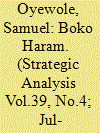

|
|
|
|
|
| Summary/Abstract |
The Boko Haram insurgency has emerged as one of the greatest threats to human security in Africa, and the Lake Chad region in particular. This is a region with a total area of 427,500 km2, which covers/ Cameroon, Chad, Niger and Nigeria. The movement known as Boko Haram (Western education is forbidden) originated in Nigeria in 2002. The official name of the movement is Jama’atu Ahlis Suna Lidda’awati Wal Jihad (People Committed to the Propagation of the Prophet’s Teachings and Jihad). The group was formed on the charismatic preaching of Yusuf Muhammad, which attracted hundreds of thousands of followers across northern Nigeria, Cameroon, Niger and Chad. The group’s campaign is informed by Islamic revivalism, widespread poverty, political corruption, repression and a weak justice system in the region.
|
|
|
|
|
|
|
|
|
|
|
|
|
|
|
|
| 2 |
ID:
139298
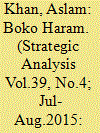

|
|
|
|
|
| Summary/Abstract |
Nigeria is currently going through a very delicate phase. The kidnapping of more than 275 Chibok schoolgirls by the terrorist organisation Boko Haram shocked not only Nigeria but the international community at large. This act by Boko Haram was widely criticised and led to worldwide condemnation and an international rescue effort. More seriously, the group leader Shekhau threatened to sell the girls into slavery and used Islamic teachings as justification.
|
|
|
|
|
|
|
|
|
|
|
|
|
|
|
|
| 3 |
ID:
139296
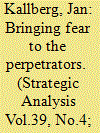

|
|
|
|
|
| Summary/Abstract |
Humanitarian cyber operations would allow democratic states to utilise cyber operations as a humanitarian intervention to capture information and create a foundation for decision making for collective international action supported by humanitarian international law. This follows the legal doctrine of responsibility to protect, which relies first on the nation state itself but when the state fails to protect its citizens, then the international community can act, ignoring the repressive or failed state’s national sovereignty.
|
|
|
|
|
|
|
|
|
|
|
|
|
|
|
|
| 4 |
ID:
139294
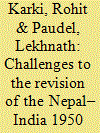

|
|
|
|
|
| Summary/Abstract |
The contemporary strategic and political environment has gone through tremendous changes in comparison to the context in which the 1950 treaty was signed. The Indian prime minister Narendra Modi’s August 2014 visit to Nepal, the first by an Indian prime minister in 17 years, has rekindled the hope of improving Nepal–India relations, including revision of the 1950 treaty. Against this backdrop, this article argues that without understanding India’s strategic, security-related and political concerns, revision of the 1950 treaty is highly unlikely. The article further argues that by identifying and addressing the key challenges, both countries can develop a shared strategic vision which in turn can provide an enhanced framework for the revision of the 1950 treaty and further strengthen the ‘special’ Nepal–India relationship in the changed strategic context of the 21st century.
|
|
|
|
|
|
|
|
|
|
|
|
|
|
|
|
| 5 |
ID:
139299
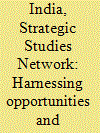

|
|
|
|
|
| Summary/Abstract |
Based on the work of the Maritime Security Working Group within the Strategic Studies Network (SSN), this report provides both diagnosis and prescriptions regarding security threats in the Indian Ocean Region (IOR). The IOR, a large maritime area that extends from coastal Africa through the Middle East and South Asia and on to Australia, is a major conduit for global trade, a littoral zone of developing powers, and the focus of a series of rising security challenges. Thus, not only is the security of the IOR of major importance for IOR littoral states, it is also of vital importance for much of landlocked Africa and Asia, along with major economic powers like China, the European Union and the United States.
This collaborative report highlights two overarching themes, the first being that the IOR, while of great importance to regional/global stability, needs to be conceived of as a key strategic zone. In short, security issues in the IOR must be addressed with a sense of urgency. The second theme is that this diverse region suffers from a lack of institutions capable of bridging gaps and easing tensions. The institutions that do exist are either ineffective or are of a very specific nature. Greater attention must be directed towards building shared perspectives on security issues, particularly as they relate to non-state or non-traditional threats.
This report reflects the desire of all participating experts in this Working Group to see comprehensive strategic assessments being developed within the global foreign policy community. Thus, this report is the start of strategic dialogues that hopefully will commence among IOR littoral states. The IOR is an essential conduit that draws in Europe, North America and the Asia-Pacific. It is too often conceived within the limitations of a sub-region (like South Asia, Eastern Africa or the Gulf). The IOR is full of threats, but it also offers attractive opportunities for enhancing global security. While the IOR’s littoral zones are often divided along national boundaries, the IOR is a huge maritime domain, where no single country can guarantee stability and where a maritime context may offer unique chances to bypass barriers inhibiting cooperation on land. The opportunity for enhancing security is there and it is hoped that this analysis can assist in the formation of policies that help all actors and nations.
|
|
|
|
|
|
|
|
|
|
|
|
|
|
|
|
| 6 |
ID:
139295


|
|
|
|
|
| Summary/Abstract |
Xi Jinping’s new reformist approach of 2013 is a close reflection of Deng Xiaoping’s prescription of 1978. The Chinese political leadership is tightening its political grip and loosening economic control. China has a tradition of leadership being an economic rightist and a political leftist at the same time. The thesis of Xi Jinping is based upon the conception that one should not use post-reform history to negate the pre-reform years. It also says that one should not ‘exaggerate’ Mao Zedong’s mistakes but should acknowledge his contributions. China’s president Xi Jinping has assumed the mantle of Deng Xiaoping, who was responsible both for huge economic changes and the Tiananmen Square massacre. The third plenum communiqué epitomises Mao’s thought, based upon socialism, a market economy, the one party system, and dominance of state-owned enterprises. Xi’s openly pro-Maoist tone, his reinforcement of Mao-era slogans and practices such as the ‘rectification’ anti-graft campaign and a ‘mass line’ ideology campaign, as well as the denunciation of Western democratic ideals and the serious attack on government critics, have created fear and anxiety among many liberals
|
|
|
|
|
|
|
|
|
|
|
|
|
|
|
|
| 7 |
ID:
139291
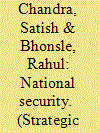

|
|
|
|
|
| Summary/Abstract |
The concept of national security has often been taken to merely connote the preservation of sovereignty, territorial integrity and internal stability with the focus on the coercive power of the state. In today’s complex and interdependent world faced with many non traditional threats like pandemics, climate change, etc it must, however, be seen in a more holistic manner. Such an all encompassing view of national security demands that the determinant of security is not just the coercive elements of state power but its comprehensive national power with the latter being a composite of many factors across all facets of national life. These factors, inclusive of leadership, if quantified, can help develop a national security index which in comparative terms could serve as an indicator of the relative security of a country vis a vis its peers. The holistic nature of national security demands that appropriate structures are in place to manage it. India is fortunate to have such structures which, of course, need revitalisation.
|
|
|
|
|
|
|
|
|
|
|
|
|
|
|
|
| 8 |
ID:
139293


|
|
|
|
|
| Summary/Abstract |
The importance of nuclear security in Asia needs to be focused upon in view of the emerging challenges of nuclear proliferation, growing nuclear arsenals, expanding civilian nuclear energy programmes, weak export controls, zones of domestic instability and terrorism in several regions within the continent. This article focuses on the factors that pose potential risks to nuclear security in Asia. It emphasises the prevailing factors endangering the security of nuclear and radiological materials in Asia. The article stresses the need to strengthen nuclear security in Asia and reinforce effective nuclear security worldwide.
|
|
|
|
|
|
|
|
|
|
|
|
|
|
|
|
| 9 |
ID:
139292
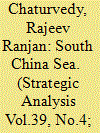

|
|
|
|
|
| Summary/Abstract |
This article looks at India’s interests and strategy in the South China Sea (SCS). First, it highlights India’s maritime interests and discusses the relevance of the SCS to these interests. It then examines some key ingredients of India’s evolving policy initiatives in the region. The article argues that with a considerable expansion of India’s engagement with the South China Sea littoral states, India appears to be genuinely emerging as an indispensable element in the strategic discourse of this region. India could be a valuable security partner for several nations in the Asia Pacific region, provided it sustains a high economic growth rate and nurtures the framework of partnership that it has enunciated in the region.
|
|
|
|
|
|
|
|
|
|
|
|
|
|
|
|
| 10 |
ID:
139290


|
|
|
|
|
|
|
|